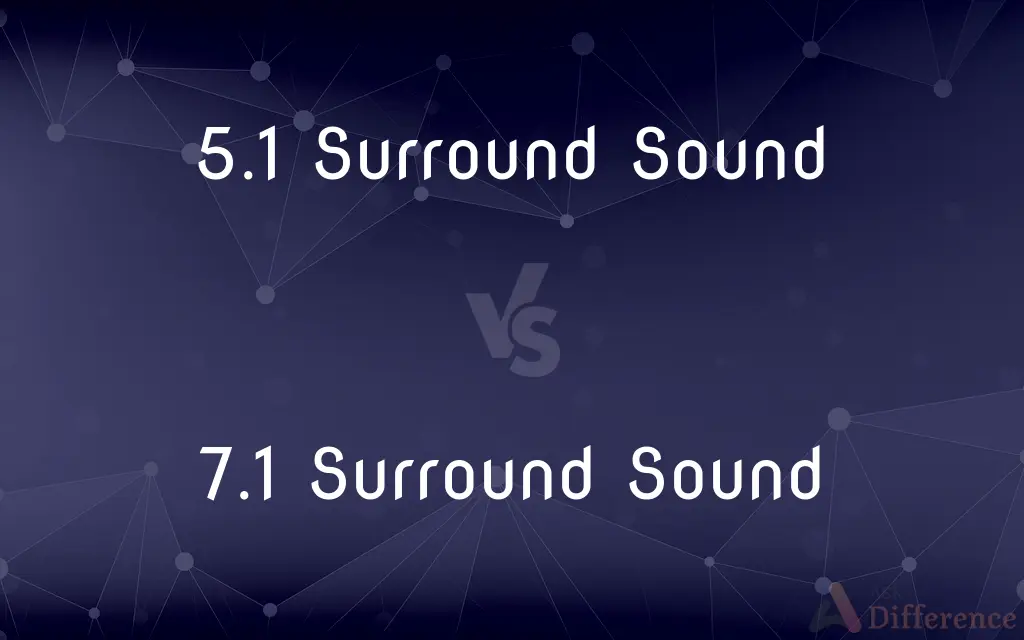5.1 Surround Sound vs. 7.1 Surround Sound — What's the Difference?
By Tayyaba Rehman — Published on February 12, 2024
5.1 Surround Sound has six channels (5 speakers and 1 subwoofer), while 7.1 Surround Sound adds two rear speakers for a total of eight channels, providing enhanced spatial audio immersion.

Difference Between 5.1 Surround Sound and 7.1 Surround Sound
Table of Contents
ADVERTISEMENT
Key Differences
five speakers (front left, center, front right, rear left, rear right) and a subwoofer. This setup delivers a cinematic audio experience, commonly used in home theaters and gaming systems.
7.1 Surround Sound builds upon the 5.1 configuration by adding two rear speakers, resulting in a total of eight channels. This expansion enhances spatial awareness and provides a more immersive audio experience, particularly beneficial for larger rooms or advanced home theater setups.
Comparison Chart
Number of Channels
Six channels (5 speakers + 1 subwoofer)
Eight channels (7 speakers + 1 subwoofer)
Rear Speaker Configuration
Rear left and rear right speakers
Adds rear left surround and rear right surround speakers
Immersive Audio Experience
Cinematic audio, commonly used in home theaters
Enhanced spatial awareness, ideal for larger setups
ADVERTISEMENT
Common Applications
Home theaters, gaming systems
Advanced home theaters, larger rooms
Audio Spatial Immersion
Provides a surround sound experience
Further enhances spatial audio for immersive effects
Compare with Definitions
5.1 Surround Sound
Configuration with five speakers and one subwoofer.
A 5.1 Surround Sound system offers a six-channel setup for a rich audio experience.
7.1 Surround Sound
Further enhances spatial audio for immersive effects.
The spatial audio effects of 7.1 Surround Sound create a more realistic and immersive soundscape.
5.1 Surround Sound
Incorporates a subwoofer for deep bass effects.
The subwoofer component in 5.1 Surround Sound adds impactful low-frequency tones.
7.1 Surround Sound
Adds rear left surround and rear right surround speakers.
The addition of rear speakers in 7.1 Surround Sound enhances spatial awareness.
5.1 Surround Sound
Ideal for creating a theater-like audio ambiance at home.
5.1 Surround Sound is a popular choice for home theaters, providing an immersive audio setup.
7.1 Surround Sound
Particularly beneficial for larger rooms or advanced home theater systems.
7.1 Surround Sound is ideal for larger setups, providing a more expansive audio experience.
5.1 Surround Sound
Commonly used in home theaters and gaming systems.
The cinematic audio experience of 5.1 Surround Sound enhances movie nights at home.
7.1 Surround Sound
Commonly used in setups aiming for a premium home theater experience.
7.1 Surround Sound is chosen for advanced home theaters seeking top-tier audio quality.
5.1 Surround Sound
Includes front left, center, right, rear left, and rear right speakers.
Front and rear speakers in 5.1 Surround Sound create an immersive audio environment.
7.1 Surround Sound
Configuration with seven speakers and one subwoofer.
7.1 Surround Sound enhances audio immersion with an eight-channel setup.
Common Curiosities
How many channels does a 7.1 Surround Sound system have?
A 7.1 Surround Sound system has eight channels, including seven speakers and one subwoofer.
How does 5.1 Surround Sound enhance the audio experience?
5.1 Surround Sound enhances the audio experience by providing a cinematic setup with surround sound effects.
What does the term "cinematic audio experience" refer to in 5.1 Surround Sound?
The term "cinematic audio experience" indicates that 5.1 Surround Sound replicates the audio quality found in movie theaters.
What are the primary applications of 5.1 Surround Sound?
5.1 Surround Sound is commonly used in home theaters and gaming systems for an immersive audio experience.
Which speakers are added in 7.1 Surround Sound that are not present in 5.1?
7.1 Surround Sound adds rear left surround and rear right surround speakers to the front and rear speakers found in 5.1.
Is 7.1 Surround Sound commonly used in home theaters?
Yes, 7.1 Surround Sound is often chosen for advanced home theaters seeking a premium audio setup.
What distinguishes 7.1 Surround Sound from 5.1 Surround Sound?
7.1 Surround Sound adds two rear surround speakers to the 5.1 configuration, providing enhanced spatial awareness.
When is 7.1 Surround Sound considered ideal?
7.1 Surround Sound is considered ideal for larger setups and advanced home theaters, offering a premium audio experience.
What audio effects does 7.1 Surround Sound provide in comparison to 5.1?
7.1 Surround Sound offers an extended audio experience with enhanced spatial awareness, making it suitable for larger rooms.
What is the basic configuration of a 5.1 Surround Sound system?
A 5.1 Surround Sound system consists of five speakers (front left, center, front right, rear left, rear right) and one subwoofer.
Do both 5.1 and 7.1 Surround Sound systems provide a surround sound experience?
Yes, both configurations offer a surround sound experience, immersing listeners in multidirectional audio.
In what way does 7.1 Surround Sound contribute to spatial audio effects?
The addition of rear surround speakers in 7.1 Surround Sound further enhances spatial audio, creating a more realistic soundscape.
How does the subwoofer component contribute to both 5.1 and 7.1 Surround Sound?
The subwoofer component in both configurations adds deep bass effects, enhancing low-frequency tones for a more impactful audio experience.
What role does spatial audio play in the popularity of 7.1 Surround Sound?
Spatial audio in 7.1 Surround Sound enhances the perception of sound direction, contributing to a more immersive and realistic audio environment.
Can 5.1 Surround Sound be sufficient for a home theater setup?
Yes, 5.1 Surround Sound is sufficient for creating a home theater-like ambiance, especially in smaller spaces.
Share Your Discovery

Previous Comparison
Jack Daniel’s vs. Johnnie Walker
Next Comparison
Club Soda vs. Seltzer WaterAuthor Spotlight
Written by
Tayyaba RehmanTayyaba Rehman is a distinguished writer, currently serving as a primary contributor to askdifference.com. As a researcher in semantics and etymology, Tayyaba's passion for the complexity of languages and their distinctions has found a perfect home on the platform. Tayyaba delves into the intricacies of language, distinguishing between commonly confused words and phrases, thereby providing clarity for readers worldwide.














































